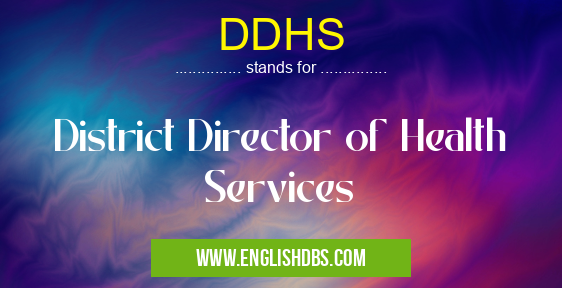What does DDHS mean in HEALTHCARE
DDHS stands for District Director of Health Services. It is a senior-level position within the healthcare system, responsible for overseeing and managing the health services provided within a specific geographical district.

DDHS meaning in Healthcare in Medical
DDHS mostly used in an acronym Healthcare in Category Medical that means District Director of Health Services
Shorthand: DDHS,
Full Form: District Director of Health Services
For more information of "District Director of Health Services", see the section below.
» Medical » Healthcare
Responsibilities of a DDHS
- Planning and Implementation: Develop and implement health programs and services to meet the needs of the district's population.
- Budget Management: Oversee the financial resources allocated to the district health services and ensure their efficient use.
- Personnel Management: Lead and supervise a team of healthcare professionals, including doctors, nurses, and other staff.
- Monitoring and Evaluation: Track and assess the effectiveness of health services and make adjustments as needed.
- Community Engagement: Foster partnerships with community organizations and leaders to enhance health outcomes.
- Emergency Preparedness: Plan and coordinate responses to health emergencies, such as outbreaks or natural disasters.
Qualifications for a DDHS
- Education: Typically requires a master's degree in public health, health administration, or a related field.
- Experience: Extensive experience in healthcare management and public health.
- Skills: Excellent leadership, communication, and interpersonal skills.
Essential Questions and Answers on District Director of Health Services in "MEDICAL»HEALTHCARE"
What is the role of a District Director of Health Services (DDHS)?
The DDHS is responsible for the overall public health operations within a specific district and provides leadership and guidance to the district's health system. They collaborate with various healthcare providers, community organizations, and government agencies to ensure the delivery of comprehensive health services to the district's population.
What are the key responsibilities of a DDHS?
Key responsibilities include: developing and implementing district-level health policies and programs, overseeing the provision of healthcare services, monitoring the health status of the population, coordinating with external stakeholders, and ensuring financial accountability.
What qualifications are required to become a DDHS?
Typically, a DDHS holds a master's degree in public health, health administration, or a related field, along with extensive experience in public health management. They must possess strong leadership skills, a deep understanding of health systems, and a commitment to improving the health of their community.
How can I reach my local DDHS?
Contact information for the DDHS in your district can usually be found on the website of your local health department or by calling the department's main phone number. You can also search online for "[Your District Name] District Director of Health Services" to find their contact information.
What resources can a DDHS provide to the community?
DDHSs provide a wide range of resources to support the health and well-being of the community, including: information on health services, health education materials, and referrals to healthcare providers and social service agencies. They may also offer programs and initiatives aimed at improving public health, such as immunization campaigns, disease prevention programs, and health screenings.
Final Words: The DDHS plays a crucial role in ensuring the provision of accessible and equitable health services within a district. Their expertise and dedication contribute to improving the health and well-being of the communities they serve.
